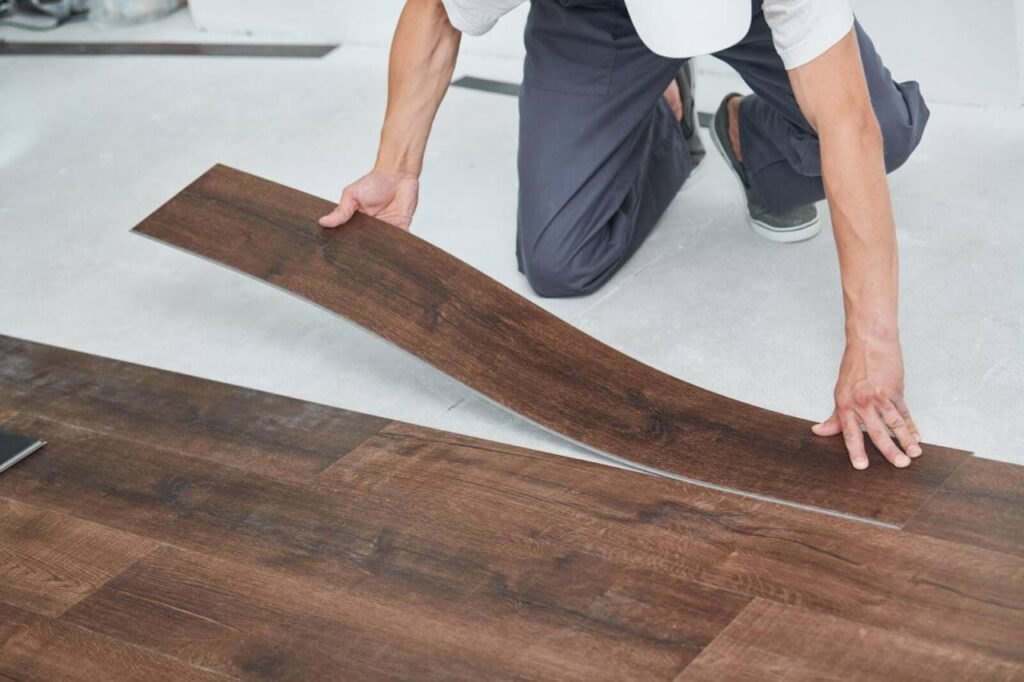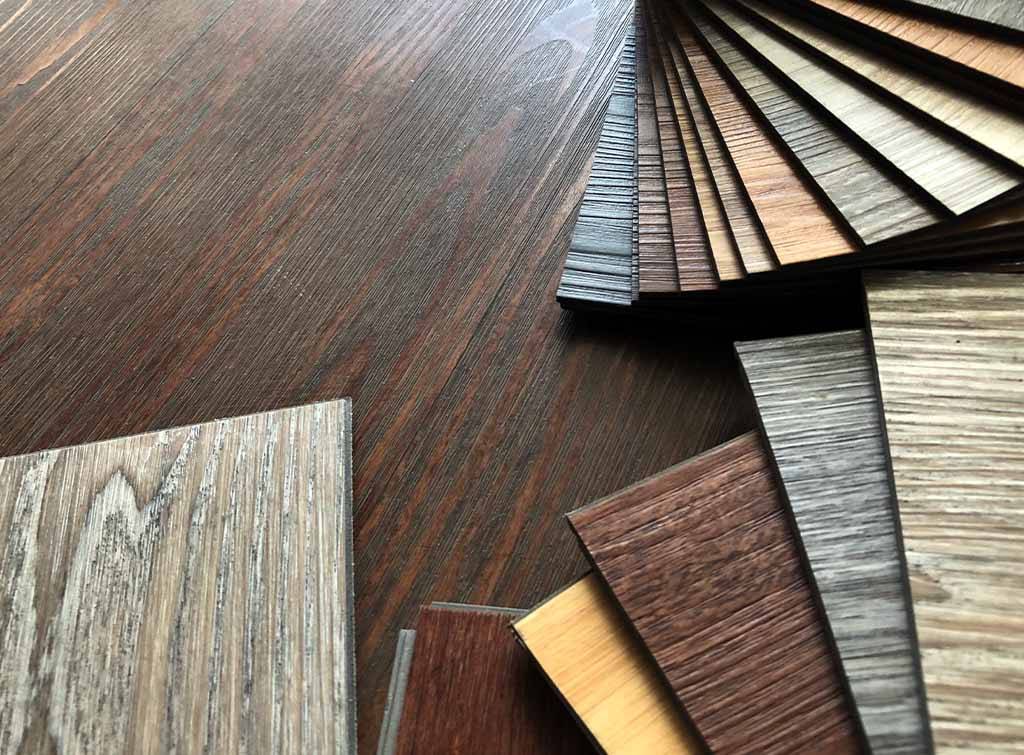Vinyl flooring has come a long way from its humble beginnings in the 1930s. Today, it’s a popular choice for homeowners thanks to its durability, versatility, and affordability.
Vinyl flooring, in a nutshell, is a durable and versatile synthetic floor covering made primarily from polyvinyl chloride (PVC). It comes in various formats to suit different preferences and needs:
- Luxury vinyl tile (LVT): Individual tiles mimicking wood, stone, or even tile, offering flexibility in design and installation.
- Luxury vinyl plank (LVP): Similar to LVT but in elongated planks, creating a seamless wood-like appearance.
- Sheet vinyl: Comes in large rolls, ideal for expansive spaces and offering a waterproof option.
- Wilt-on vinyl: Features a woven backing for added comfort and softness underfoot.
Pros and Cons of Vinyl Flooring
Vinyl flooring has become a popular choice for homeowners thanks to its numerous advantages. But like any other material, it also comes with its own set of drawbacks. Here’s a comprehensive breakdown of the pros and cons of vinyl flooring to help you decide if it’s the right fit for your home:
Pros:
- Durability: Vinyl flooring is incredibly tough and can withstand scratches, dents, and stains. This makes it ideal for high-traffic areas like kitchens, hallways, and living rooms.
- Waterproof (certain types): Luxury vinyl tile (LVT) and luxury vinyl plank (LVP) are typically waterproof, making them perfect for moisture-prone areas like bathrooms, laundry rooms, and even basements.
- Easy to clean: Vinyl flooring requires minimal maintenance. Regular sweeping or mopping with a mild detergent is enough to keep it clean and looking fresh.
- Affordable: Compared to other flooring options like hardwood or tile, vinyl is significantly more budget-friendly. This makes it a great choice for homeowners on a tight budget.
- Versatility: Vinyl flooring comes in a wide variety of colors, patterns, and styles to mimic the look of wood, stone, tile, and even concrete. This makes it easy to find a style that matches your décor.
- Comfort: Vinyl flooring is softer and more comfortable underfoot than tile or hardwood. This makes it a good choice for homes with children or pets.
- Warmth: Vinyl flooring is a good insulator, so it can help keep your home warm in the winter.
Cons:
- Environmental impact: Vinyl flooring is made from PVC, which is a petroleum-based product. This raises concerns about its environmental impact and sustainability.
- Temperature sensitivity: Extreme cold or heat can cause vinyl flooring to become brittle or warp. This is not ideal for climates with significant temperature fluctuations.
- Potential resale value impact: While high-quality vinyl flooring can look great, it may not add as much value to your home as other flooring options like hardwood or tile.
- Installation complexities: While DIY installation is possible, some types of vinyl flooring, like glue down vinyl, require professional installation, which can add to the cost.
Overall, vinyl flooring is a great choice for homeowners who are looking for a durable, affordable, and versatile flooring option. However, it’s important to weigh the pros and cons carefully before making a decision. If you’re concerned about the environmental impact, there are now eco-friendly vinyl flooring options available.
How to Choose Vinyl Flooring?
Choosing the perfect vinyl flooring for your home can feel overwhelming with the vast array of options available. But fret not, here’s a breakdown of key factors to consider to guide you towards the ideal choice:
1. Room Usage and Traffic:
- High-traffic areas: Opt for thicker (4mm or above) and more durable LVT or LVP with a higher wear layer (0.5mm or above) to withstand heavy footfall.
- Moisture-prone areas: Choose waterproof LVT or sheet vinyl for bathrooms, laundry rooms, or basements.
- Low-traffic areas: Thinner vinyl (2-3mm) might suffice for bedrooms or guest rooms.
2. Style and Design:
- Mimicking natural materials: LVT and LVP excel at replicating wood, stone, or tile aesthetics.
- Modern or classic look: Choose patterns, colors, and textures that complement your existing décor. Bold geometric patterns can add a modern touch, while wood-grain patterns offer a classic vibe.
- Size and layout of the room: Lighter colors and smaller patterns can visually expand small spaces, while larger patterns work well in spacious rooms.
3. Budget and DIY Skills:
- Glue down vinyl: Offers superior durability and soundproofing but requires professional installation, making it more expensive.
- Floating vinyl: Easier to install yourself with click-lock systems, but might be less durable and slightly more expensive than sheet vinyl.
- Sheet vinyl: Most affordable option, ideal for large areas, but requires precise cutting and seamless installation, often best left to professionals.
4. Additional Considerations:
- Comfort: Opt for thicker vinyl with padding for a softer feel, especially in areas where you stand or walk for extended periods.
- Maintenance: Choose stain-resistant and easy-to-clean options for high-traffic areas.
- Environmental impact: Consider eco-friendly vinyl flooring made from recycled materials or with low-VOC emissions.
By carefully considering these factors and browsing through the plethora of vinyl flooring styles available, you’re sure to find the perfect option that meets your needs and preferences.
FAQs
Is vinyl flooring waterproof?
Not all vinyl flooring is waterproof. However, luxury vinyl tile (LVT) and luxury vinyl plank (LVP) are typically waterproof, making them perfect for moisture-prone areas like bathrooms, laundry rooms, and even basements. Sheet vinyl can also be waterproof depending on the specific product.
Is vinyl flooring durable?
Yes, vinyl flooring is known for its durability. It can withstand scratches, dents, and stains, making it ideal for high-traffic areas like kitchens, hallways, and living rooms. Thicker vinyl with a higher wear layer offers even better durability.
Is vinyl flooring easy to clean?
Absolutely! Vinyl flooring requires minimal maintenance. Regular sweeping or mopping with a mild detergent is enough to keep it clean and looking fresh. Its stain-resistant properties make it even easier to maintain in busy households.
Is vinyl flooring affordable?
Compared to other flooring options like hardwood or tile, vinyl is significantly more budget-friendly. This makes it a great choice for homeowners on a tight budget. The cost can vary depending on the type, thickness, and features of the vinyl flooring you choose.
Is vinyl flooring eco-friendly?
Traditional vinyl flooring made from PVC has raised concerns about its environmental impact due to its petroleum-based origin. However, there are now eco-friendly vinyl flooring options available made from recycled materials or with low-VOC emissions.
Is vinyl flooring easy to install?
The installation difficulty of vinyl flooring depends on the type you choose. Floating vinyl with click-lock systems is relatively easy to install yourself, while gluedown vinyl requires professional installation due to its complexity. Sheet vinyl can also be challenging to install seamlessly and might be best left to professionals for large areas.
Does vinyl flooring add value to a home?
While high-quality vinyl flooring can look great and elevate the aesthetics of your home, it may not add as much resale value as other flooring options like hardwood or tile. However, its affordability, durability, and ease of maintenance can still be attractive selling points for potential buyers.


